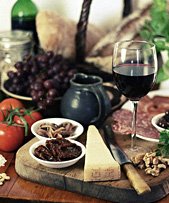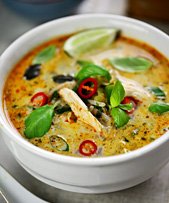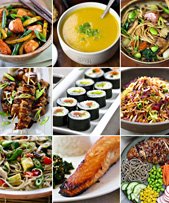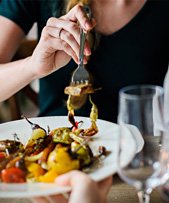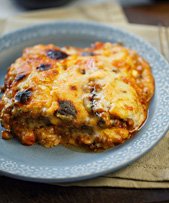Frequently asked questions
These are the most frequently asked questions about a MediterrAsian diet and lifestyle.
A MediterrAsian diet combines the best elements of the world’s
healthiest diets, the Mediterranean diet and Asian diet. It
brings together a wide variety of very nutritious yet delicious
foods, and naturally includes very little of the highly
processed foods that dominate modern Western diets. According to
a growing number of health experts, a MediterrAsian diet is the
optimal way to eat for health and longevity.
Cooking techniques and seasonings differ, but research has
found that the traditional dietary practices of Mediterranean
and Asian cultures actually share many similarities. Their diets
include abundant amounts of plant foods such as vegetables,
fruits, grains, beans and nuts; they consume fish regularly but
red meat in small amounts; most of the fat they consume comes
from plant and fish oils; and they generally consume alcohol in
moderation, usually with meals. And it’s these shared dietary
patterns — rich in antioxidants, dietary fiber, omega-3 fatty
acids and anti-inflammatory compounds — that scientists believe
is the main reason people from Mediterranean and Asian cultures
also share the same good health and long lives.
There are a number of very beneficial foods that are consumed
in the Mediterranean region that aren’t traditionally consumed
in Asia — such as olive oil and red wine. There are also a
number of health-giving foods common in Asian diets that aren’t
traditionally part of a Mediterranean diet — such as seaweed,
green tea and soyfoods. So, by combining traditional
Mediterranean and Asian eating practices you literally get the
best of both worlds.
Traditional Mediterranean and Asian diets are rich in natural
plant compounds called polyphenols. Consuming these
polyphenol-rich foods — including extra virgin olive oil,
turmeric, capers, green tea and red wine — activates a family of
housekeeping genes in the body called sirtuins. Scientific
research has found that sirtuins play a fundamental role in
slowing cellular ageing and repairing DNA. Activating sirtuins
also helps the body better regulate blood sugar levels, makes
cells more resilient to stress, and improves the body’s ability
to burn fat for energy.
German scientists from the University of Kiel found that a
polyphenol-rich MediterrAsian diet activated sirtuins in a very
similar way to severe calorie restriction (which also activates
sirtuins), but without having to restrict calories. Their
groundbreaking research was published in the scientific journal
Oxidative Medicine and Cellular Longevity in 2013. They wrote,
“We suggest that a so-called ‘MediterrAsian’ diet combining
sirtuin-activating foods (= sirtfoods) of the Asian as well as
Mediterranean diet may be a promising dietary strategy in
preventing chronic diseases, thereby ensuring health and healthy
ageing.”
But high sirtfood consumption isn’t the only reason people from
Mediterranean and Asian cultures traditionally enjoy such
exceptional health and long lifespans. Unlike modern Western
diets that are full of highly processed foods, a MediterrAsian
diet is based on a foundation of minimally processed foods like
vegetables, fruits, grains, beans, nuts, olive oil, and fish.
These foods are overflowing with health-promoting compounds
including omega-3 fatty acids, phytochemicals, antioxidants, and
also dietary fiber — which is great for gut health and is also
one of nature’s best appetite suppressants.
While diet seems to play the most important role, people from
Mediterranean and Asian cultures also share other lifestyle
habits that are linked to better health and a longer life. For
example, moderate physical activity is a part of their everyday
lives, they typically set time aside each day to relax and
unwind, and social ties are strong — including gathering around
the table and celebrating meals together.
Studies have shown time and time again that Mediterranean and
Asian peoples who adopt a typical Western diet and lifestyle
substantially increase their risk of developing chronic
illnesses such as heart disease and certain cancers. Many other
studies have shown that when Westerners adopt a Mediterranean or
Asian diet and lifestyle their health improves and their chronic
disease risk substantially decreases. This demonstrates that the
good health traditionally enjoyed by Mediterranean and Asian
peoples has very little to do with genetics and a lot to do with
what they eat and how they live.
The foundation of traditional Mediterranean and Asian meals is
typically plant-based foods such as vegetables, fruits, grains,
and beans. These foods are bulky and filling but are generally
low to moderate in calories. Fish and shellfish, which are also
traditional Mediterranean and Asian staples, are also quite low
in calories and are a good source of hunger-suppressing protein.
So, these foods fill you up long before they fill you out. They
also more than counter-balance the higher calorie foods that are
also part of a MediterrAsian way of eating — such as nuts, olive
oil and cheese. This means that by eating the MediterrAsian way
you end up feeling comfortably full after a meal, without
consuming more calories than your body needs.
We’ve received hundreds of emails from people all over the
world who’ve told us how the recipes and information we share
has made a difference to their lives. For some it's been simple
differences — like finally being able to get their kids to eat
vegetables and actually enjoy them; or being able to regularly
put a healthy and satisfying dinner on the table without having
to slave away in the kitchen for hours.
For others the differences have been more profound. We've heard
from people with high cholesterol who were able to bring their
cholesterol levels into a healthy range within only a few
months. We've heard from diabetics and those with high blood
pressure who no longer need to take medication. We've also heard
from people who've lost significant amounts of weight without
ever feeling deprived, and from those who've said they've never
felt better or had more energy in their lives. These success
stories aren’t just incredibly heartwarming to us, they also
confirm that traditional Mediterranean and Asian eating
practices really are the healthiest and most enjoyable in the
world.
Eating this way has introduced us to a world of wonderful new
tastes and experiences. Over the years, through trial and error,
we've also learned a lot about authentic Mediterranean and Asian
ingredients and cooking techniques. So, some of the recipes are
our versions of classic Mediterranean and Asian dishes like
risotto and sushi. But we also love to spend time in the kitchen
experimenting and developing new recipes using traditional
Mediterranean and Asian ingredients.

